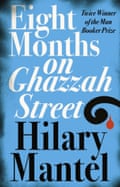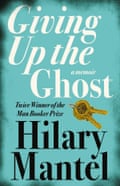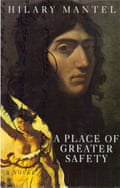From left; Ben Miles, Sarah Waters, Sara Collins, Margaret Atwood, Anne Enright, Kate Williams, Colm Tóibín. Composite: PR
Hilary Mantel
My favourite Mantel: by Margaret Atwood, Colm Tóibín, Anne Enright and more
From Wolf Hall to Beyond Black and Giving Up The Ghost, cultural figures pick their highlights from a remarkable career
From Wolf Hall to Beyond Black and Giving Up The Ghost, cultural figures pick their highlights from a remarkable career

Wolf Hall and Bring Up the Bodies
Margaret Atwood
The Tudors! Who can resist them? Gossip! Rumour! Scandal! Ruffs! Backstabbing! Madrigals! Farthingales! Witchcraft! Lace-on velvet sleeves! Cut-off body parts! More!
We know the plot, or at least its bare outlines, but we seem compelled to relive it in books, films, plays, operas, and television series: and all the more so when viewed through the shrewd, calculating, vengeful, cautious, Machiavellian eyes of master game-player Thomas Cromwell, fixer and hitman to Henry VIII, as rendered in sumptuous, riveting detail by Hilary Mantel in Wolf Hall. If Cromwell had had a phone Mantel could hack, you’d scarcely be brought closer to the inner wheels and cogs of his bloody-minded and bloody-handed machinations.
Bring Up the Bodies picks up from Wolf Hall. Things are not going well for Anne Boleyn, who has beguiled her way into the queendom over the cast-off though not yet dead body of Katherine of Aragon, but has failed to produce a male heir. Nor is she playing her cards adroitly: she’s too smart, too argumentative, too intent on influencing policy, too secretly Protestant, and too prone to miscarriages. It’s clear that Henry now wants to be rid of her, having spotted a more docile girl in Jane Seymour; and once he’s made this wish explicit, Cromwell goes to work. It’s always a dicey job, being henchman to an absolutist tyrant, especially one who’s becoming increasingly paranoid and petulant. There was that fall from the horse and the concussion, and then the weeping sore on his leg: what exactly was wrong with Henry? Doctors are still pondering; but whatever it was, it did not improve his temper.
We’re the silent sharers of Cromwell’s deliberations as he weaves his way to his goal – the removal of Anne, and, not incidentally, payback for the courtiers who had humiliated his old master, Cardinal Wolsey – through secret dealing, blackmailing, hectoring, torturing, and the stage-managing of a bogus show trial worthy of Stalin. We know the story won’t end well for him – henchmen often capsize – but we watch with horror and admiration as he achieves his gruesome ends.
Mantel’s triumph is to make us understand – and even like, in a grudging sort of way – this historically unattractive figure. Her meticulous research is lightly worn, unlike the carefully considered fabrics and textures of the courtiers, and her depiction of the many flawed human instruments on which Cromwell plays is sadly convincing.
I await the forthcoming third volume, The Mirror & the Light, with great anticipation. There’s an axe in it somewhere, I’m guessing. No spoilers though.

Ben Miles
I had heard that the Royal Shakespeare Company was going to dramatise Wolf Hall and Bring Up the Bodies and so when, a few months down the line, I got a call asking if I’d like to play Thomas Cromwell I was excited and slightly daunted. That was the beginning of my journey with Cromwell, and also with Hilary Mantel, who I first met in the RSC rehearsal rooms. Having just read her books it really hit home what an incredible piece of work they are.
Of course the stakes were high, but through it all we had the writer. Hilary became a great editor and adapter of her own work. We’d be rehearsing a scene that wouldn’t quite click and in 20 minutes she would rewrite it and it would work. If she said “leave that with me” she’d come back the next morning and there’d be a far better version of the scene which you could learn in an instant because it sounded so much like the characters you were playing.
I loved inhabiting and reading the stories and it’s hard to pick a favourite. But I’ve just been reading the section where Ambassador Chapuys comes to dinner with Cromwell. There are fabulously intimate one-to-one moments in the room: you can hear the timber creaking in the chair, taste and smell the food being served by the cook - the eels, the apricots, the sauces – and then there’s the conversation, which is delicate, world changing, threatening, light, funny, horrific. It’s all there as these two great men discuss greater men than themselves. I often get transported into that room and feel if as if I’m simply transcribing what’s going on in a world in which I’ve been placed. These books are the most wonderful social and psychological studies.

The Giant, O’Brien
Colm Tóibín
In the London of 1782, many spectres haunt the Giant O’Brien. These include his own failing health, and also the prospect of another, even larger giant following from Ireland to compete with him. The fact that he continues, painfully, to grow in size makes him melancholy, and the rumour of a performing pig that can count and read makes him wonder. Most chillingly, for the reader, there is a bodysnatching doctor who wishes, when the Giant’s demise occurs, to possess his bones in the name of science. In the meantime, O’Brien and his hangers-on get what income they can from putting on a peep-show: pay money and see a giant. All around them are men and women, many from Ireland, down on their luck, some of them almost starving. When they are not scrambling to survive, they sit around and drink and tell stories, O’Brien the most intelligent and best raconteur among them.
The novel is written in darting, suggestive sentences; the dialogue, in all its stoical tones and elements of good and bad humour, is like a chorus, or a commentary on life and its hardships. Using hints and clues, a deceptive indirection, Mantel allows us to enter the wounded spirit of her giant and the restless mind of the inquiring and ambitious doctor-cum-bodysnatcher. Their circling of each other is conducted with slow subtlety, but also with an unsparing sense of doom.
The writing has a dark, sly wit. The Giant himself often becomes magnificently eloquent, his very height, it seems, giving rise to exalted thoughts and extended anecdotes. The novel feels guarded, intimate. Mantel has no interest here in panorama, or painting a large-scale portrait of late 18th-century London. Instead, the drama is between the characters; their lives and their visions are, by necessity, circumscribed, which gives the texture of the novel an intensity. There are moments that dramatise the tension between Ireland and England, but that is just background. In the foreground are hunger and greed, and many types of distraction, not least the hope of money and a sense of abiding fatality and the arrival of other so-called freaks, including a woman who eats pins.
Towards the end of the book, the Giant “has learned this lesson: anything you can imagine, can exist”. In her novel, Mantel conjures up this world in all its strangeness with astonishing single mindedness. Anything she imagines comes into complex life. The text gives you no clue about the author or her concerns, her own history or her opinions. Instead, Mantel’s gaze is directed outwards. Her imagination in this novel is neither mirror nor lamp, but rather a piercing ray of light that makes the layers of shadow in the scenes she creates all the more pronounced and beguiling.

Eight Months on Ghazzah Street
Sarah Waters
It’s hard to pick a favourite Mantel novel. Not just because they’re all so good, but also because each is so distinct. She is one of those inspiring authors who has been fabulously unafraid of pushing her writing into new physical and literary landscapes.
The landscape evoked by Eight Months on Ghazzah Street (1988) is that of 1980s Jeddah. Thirtysomething Frances Shore arrives to join her architect husband, and finds herself part of an expat community that has been lured to the city by the promise of swollen salaries. It’s a stultifying world, gossipy and casually racist – a world of sticking it out till pay-day by hosting jolly little dinner parties, by brewing bootleg wine in the bathroom, stocking up on gold at the souk ... Mantel’s fiction bristles with “difficult” women, and this novel features one of the best: much of the mordant humour comes from the fatally bad fit between Frances and the ghastly fellow Brits with whom she is obliged to socialise, as well as from her furious run‑ins with the misogyny, hypocrisy and Kafkaesque obfuscations of everyday Saudi life.
Because the Jeddah of Eight Months is a nightmare of a city. Glutted with wealth, throttled by censorship, it’s a place of secrets, fear and disorientation, a place where even the physical terrain seems to shift and baffle, as brash new buildings spring up almost overnight. Frances, a cartographer by trade, has lost her bearings. But is she also, we begin to wonder, losing her mind? Jobless, stuck at home all day, unable to take a stroll on streets where unveiled women face continual harassment, she begins to obsess about the supposedly empty flat upstairs. She hears footsteps and muted sobbing, she glimpses figures in the hall. Is the flat, as local rumour has it, the trysting-place for a pair of illicit Saudi lovers? Or is something much more sinister going on? One of the delights of this novel is the way it speaks to a thrilling tradition of “woman in peril” stories, the footsteps overhead evoking Patrick Hamilton’s Gas Light, the apartment building’s decor – a mass of hideous tiles, each resembling a single bloody-eyed face in a rictus of pain – recalling the jaundiced walls of the bedroom-prison in Charlotte Perkins Gilman’s The Yellow Wallpaper. Ultimately, however, as the disorientation expands, we realise that there are not just misogynies at work here: there are cultural myopias, competing models of freedom, competing versions of Islam.
Or do we? I’ll be honest: I’ve read this book three times, and I’m still confused about what the hell’s going on. But that’s part of what takes me back to it. Creepy and claustrophobic, Eight Months on Ghazzah Street is a gothic masterpiece, and as with all great gothic texts, the reader has to forswear comfort, surrender confidence, become like Frances Shore herself – not sure, in fact. Not sure at all.

Giving Up the Ghost
Anne Enright
Hilary Mantel sees things that other people do not see – and not just political undercurrents, secret ambitions or subtexts. In her memoir Giving Up the Ghost she is happy to discuss her experiences beyond the literal; the fact that she has seen or sensed presences of one kind or another, including the ghost of her dead stepfather. This “flicker against the banister” is only one of the spirits mentioned on these pages; there are also metaphorical demons and the devil incarnate, not to mention the ghostly forms of pennine sheep, by which she means real sheep, the kind that go “baa”.
Mantel grew up in Hadfield, Derbyshire, a stony town so windswept she was 11 years old before she saw a real rose. Her family was part of a beached and declining Irish Catholic population of immigrant workers: her mother was a mill-girl, her grandmother did not have the luxury of knowing her own birthday. Mantel’s grandfather served in North Africa and her memory of him is thronged by the men who did not come home. At the age of four, she walked into school knowing how to load a machine-gun belt, and waiting for the moment she would become a boy. “My best days,” she writes of this moment, “were behind me.”
The psychic rupture happens first in her parents’ marriage and then in herself with one piercing, childish thought: “I stop them from being happy.” She falls into repeated fevers, loses her thick hair, her robust about-to-be a boy body, and she turns into a child the local doctor calls “little Miss Neverwell”.
At seven going on eight her (under-described) father yields his place in the marital bed to a man called Jack, and moves into his daughter’s bedroom. At around this time she sees in the back garden a nauseating “disturbance of the air”, a terrible absence that fills her with dread and then with itself, “a body inside my body, amphibian, budding and malign”. Not many writers could deliver this episode as fact, but to do otherwise, Mantel says would be to deny its phenomenological accuracy. This happened to her. It may be explained but not explained away.
“This was the beginning of shame.” If you want to know why Mantel writes fiction, or indeed if you want to know why fiction is necessary, then the answers to both of these urgent questions can be found in Giving Up The Ghost.

Beyond Black
Sara Collins
In the epigraph to her first published novel, Every Day Is Mother’s Day, Hilary Mantel quotes Pascal: “Two errors; one, to take everything literally; two, to take everything spiritually.” According to Mantel in an interview in 2009, this could well have been the epigraph for everything she’d ever written to that date. It would certainly have been an apt introduction to Beyond Black, her 2006 Orange-prize shortlisted novel, which aims to avoid both errors by intending very firmly to be taken both literally and spiritually. The result is a rare, almost hallucinatory reading pleasure.
Actual ghosts circulate in the village halls where travelling medium Alison channels messages from the dead, striking only in their sheer banality: exhortations to get an eye exam, compliments on kitchen renovations. What feels like magic is carefully constructed by building up the minutiae of daily life (“A certain class of dead people was always talking about cardigans. The button off it, the pearl button …”). It’s what convinces the punters their dearly departed are really there, and it’s also how this novel pulls off the same trick: keeping the reader at once on the literal plane and the spiritual one.
While the afterlife is mundane, the real world is re-cast as anarchic purgatory, with night closing in on its “perjured ministers and burnt out paedophiles …” Alison is also haunted by apparitions far more sinister than cardigan-hunting grannies, including her lecherous spirit guide Morris. Dark hints intrude, suggestions of a childhood in which he played some despicable part: a mother who prostituted her own under-aged daughter; feral dogs with a taste for human flesh; a disembodied head floating in the bath. This feels agonisingly literal, but we sense that Mantel intends these vulgar, rampaging demons to stand in also for dislodged fragments of memory, the novel reaching for metaphor to make its point, which is of course about the everyday world, not the spiritual one. We might, it suggests, be just as likely to find hell growing up in a rundown house in Aldershot as anywhere else.
Yet even where its terrors are biblical in intensity they often also manage to be entertainingly absurd, marrying the ridiculous and the sublime, as when Princess Diana manifests, wearing her wedding dress. “Give my love to my boys!” she exclaims, and then: “Oh fuckerama! Whatever are they called?” It is an astonishing novel, with a spine-shivering gothic pulse. Part of the joy of rereading it, as with all of Mantel’s earlier work, lies in discovering the motifs that return again and again. Resurrecting Thomas Cromwell may have won her the Booker, twice, but Beyond Black is propelled by an awareness of text as a kind of transubstantiating material, a vehicle for bringing back the dead.

A Place of Greater Safety
Kate Williams
A Place of Greater Safety, Mantel’s magum opus on the French Revolution, follows three young men from humble backgrounds, good lawyers, three times as intelligent as the men they serve. Maximilien Robespierre, Georges-Jacques Danton and Camille Desmoulins: provincial boys given a head start thanks to their preternatural intelligence, living in Paris, hauling themselves up through hard work, surrounded by a profligate and lazy aristocracy. They are, like everyone, at the mercy of whimsical, spendthrift monarchs, the king a “large, pious, conscientious boy”, the Queen wearing “diamonds like naked blades”, and a selfish aristocracy. Sound familiar? But, of course, unlike Thomas Cromwell, they don’t become the power behind the throne, they throw it all to the ground.
Mantel has done her research, explored deep into the sources, as we know she always does. What the historical novel gives us beyond those facts is imaginative proximity. The historian cannot attribute motivation but the novelist must go deep into the head, find desire, faith, love and hatred – and in the characters of the French Revolution she does, to brilliant effect. Danton most of all is made real, a man of fear and hope, desire and equivocation. And she brings to life the ordinary people whom Marie Antoinette sees on her way to the scaffold, the glass-workers who down tools and stream out for revolution.
The inner lives of women are often hidden from historians, but Mantel imagines them superbly. Most of all, Paris bursts from the page: the court, the exhausted milliners, the actors painting their faces every evening, the hard-drinking shoe-makers, the markets and factories and, as the city freezes and starves, “ships are impaled on the ice, with grain rotting in their holds”. These are the people who drove the revolution but are so often hidden from historians because they left so few traces. Mantel takes us into the ordinary houses and streets in which revolution was plotted, a new world was planned.



No comments:
Post a Comment